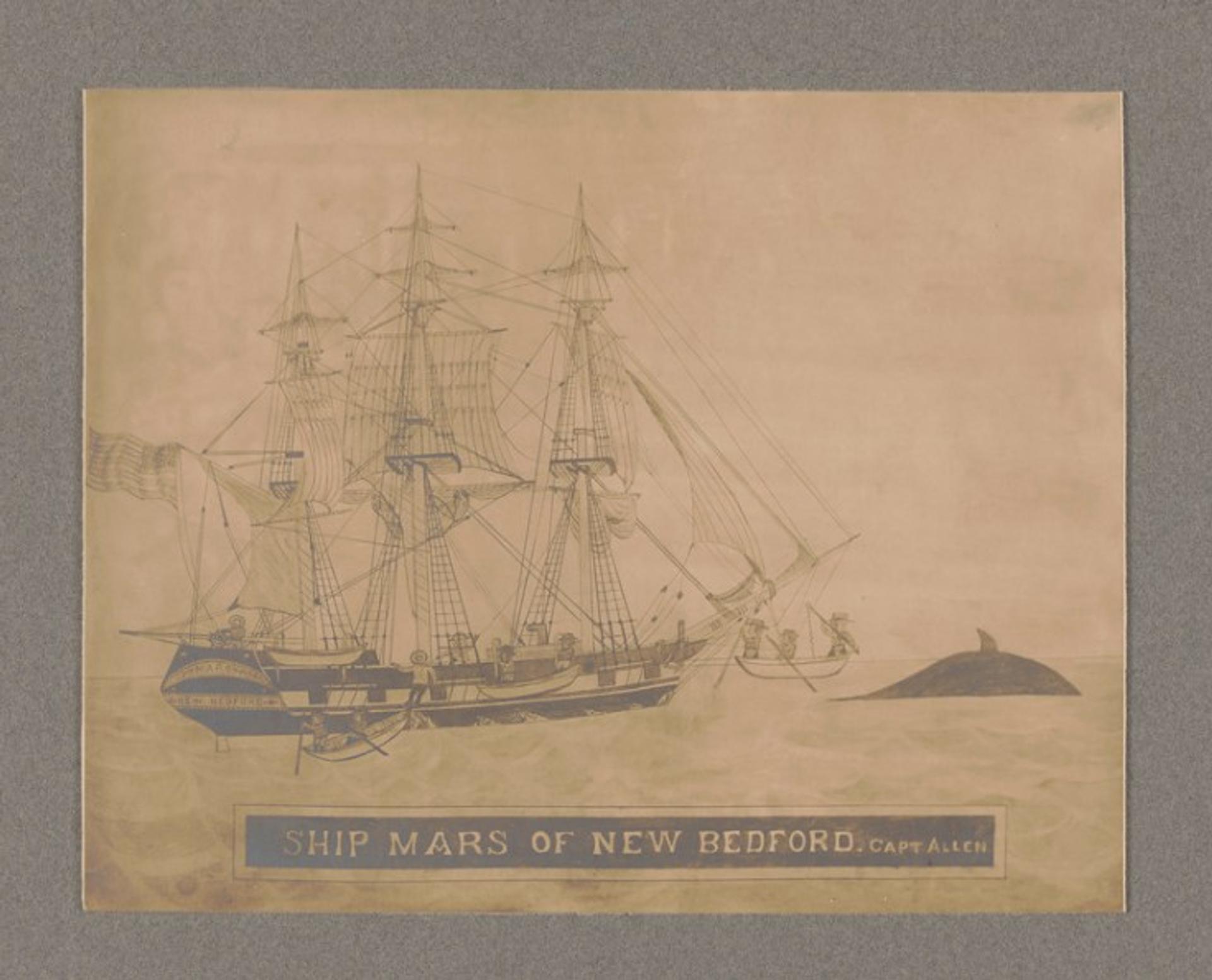Eli Dodge
Vessel Name: Mars
Eli Dodge
Killed by a whale; body not recovered
04 September 1858

The Mars, courtesy of the New Bedford Free Library
Eli Dodge was a young whaling man, born in Connecticut around 1836. He survived his greenhand voyages to become a boatsteerer at the age of 22 years. In June 1856 he boarded the whaling barque Mars at New Bedford. She was bound for the Indian Ocean. Her commander was Captain Gerardus Harrison, who sailed with his wife. She was aboard ship for the voyage to Western Australia with plans to disembark at Geographe Bay for a few months there.
It was a long voyage. Mars finally anchored in Geographe Bay on 20 February 1858. She had many greenhands and young men aboard, more than was usual for a voyage. America was in the flush of gold fever, and young men flocked to the goldfields where they could earn more, and where they were not at sea for years on end.
The youngest lad aboard was 13 years old. He would be almost 18 by the time he got home. The next youngest greenhands were 16-year-olds, Charles Jenks and Otis T Redding. There were at least 8 more greenhands. The cooper William Barton and the carpenter Roland Smith were 21 years old. Boatsteerers Samuel Carey and Eli Dodge were 21 years of age. In truth there was only a small handful of experienced crew members, including the old cook, Willis S Dalby who was 58 years old.
The Mars was a 270-ton barque built in Newbury, Massachusetts in 1823. She favoured the square sail rigging of the American whaleships. She made 25 voyages in her working life, retiring in 1894. There are journals of her exploits and travels in the New Bedford museum. During the voyage commencing in June 1856, a journal was kept by Levi Hart, a crew member as well as the ship’s log maintained in detail by Captain Harrison. Mrs Harrison kept a journal of her own, with her view of the whaleship its crew and all manner of details she found interesting.
Mars had not caught many whales before arriving at the Western Australian coast. The crew hoped for better luck and the old hands hoped for more competence from the young crew. They were all on lay wages (percentage of the catch). Without filling the hold with oil barrels, they could not go home.
So, anchored in Geographe Bay, Gerardus Harrison awaited seven more whaleships joining the fleet: Oriole, Marina, Kathleen, Swallow, Eagle, Iowa and Pacific. The ships chased whales off the coast, following the whales north. They returned to the Western Australia coast again in 1958.When they could not catch whales, the crew hunted turtles to supplement their catch.
On 4 September 1858 Mars was chasing whales off the Jurien coast. Jurien was a very new settlement but there was fresh water there. Out at sea, the whaleboats were put out to chase humpback whales. They had not been able to catch many of the prized sperm whales and mostly settled for whatever whales they came across. At the cry of the watch in the crow’s nest “There she blows”, First Mate Jammes McKenzie shouted back “Where away”? As soon as he knew, he ordered the whaleboats be put into the water. The boatsteerers and oarsmen threw themselves into the whaleboats and began the chase.
Eli Dodge’s boat fastened onto a whale bull, and he steered the boat while the whale dragged the small vessel. It was Eli’s job to make sure the line didn’t tangle and take the boat down. The whale tired and the crew pulled closer to it, allowing Eli to throw a killing harpoon. He stood to throw the final lance when the whale lashed out and struck the boat with its tail.
The tail smashed the boat and struck Eli. The oarsmen were thrown into the water. In the chaos that followed the whale swam away, and the crew grabbed pieces of the whaleboat to help them stay afloat. It would be a while before the ship could launch a boat to rescue them.
At first no one noticed Eli was missing, but it was not long before the floating oarsmen realised, he was not in sight. They had seen the whale’s tail sweep the boat and land heavily where Eli was standing.
It seems the crew were rescued. The ship’s boat stayed in the area searching for Eli. There was no sign of him. His body was not recovered.
Although only 22, Eli was a popular member of the crew of the Mars, and other ships he had worked on. The cook of the whaleship Sunbeam was a slave-born African American, Corporal James Hennery Gooding. James was also a writer. He wrote a poem about Eli’s death. The poem was discovered and published in 1981 with more works about his whaling days.
He has gone from our gaze, he’ll never more return
A shipmate we all did revere,
We no more of him, our duty will learn,
No more with us, will he make cheer.
He had perhaps a dear cottage home,
Or maybe a sister or a brother,
Who knows but a wife, the joy of his life,
A child, or a fond loving mother.
He was brave in the storm, ‘He was kind in the calm,
His duty he done like a man,
But now he is free from this world’s alarms
And safe moor’d in the Spirit land.
He ofttimes with us did the monster pursue,
The huge monster king of the deep,
But now he is gone, and his journey is through,
Where lond billow’s roll he does sleep.
How little we thought, but a moment before,
When near us he bravely did contend,
With the huge monster then weltering in its gore,
That he would to hades Eli send.
But he’s gone from our gaze, his long race is run,
In death’s cold embrace he does lie,
Yes Father of Mercies Thy will be done,
And take his soul to Thee on High.
